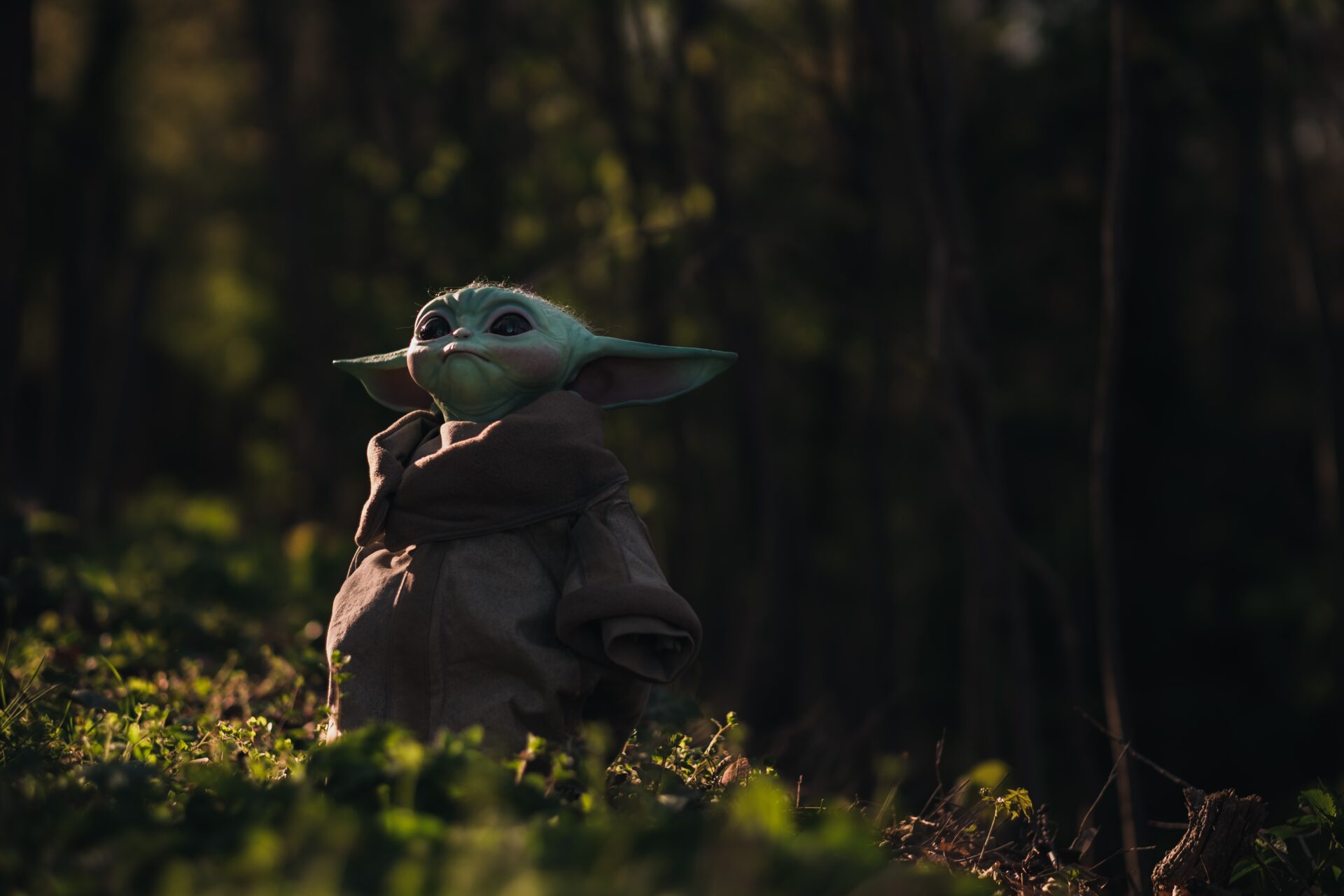
Grogu from The Mandalorian.
Photo by Emmanuel Denier on Unsplash
Nonverbal proclamations of faith
We are a family that loves Star Wars, and particularly were drawn to the series The Mandalorian because of the main character, Din Grogu. Grogu was first known popularly as “Baby Yoda” because he is the same small species as the character Yoda who lived to be 900 years old. Grogu is 50 years old, and developmentally that would make him around 4-5 years old. However, he does not speak verbally. In season three, the Anzellans, a small species that are known for their repairs of droids, outfit the shell of a droid, IG-11. The shell of the droid becomes an assistive exoskeleton for Grogu. The “foundling,” as children among the Mandalorians are called, is now able to walk and keep up with those who are human-sized. In addition, Grogu can access the communication panel from the robot and say “Yes,” and “No,” and he does so repeatedly.
Our son A.J., who also loves Star Wars, is fourteen, autistic, and mostly nonverbal. When he was in kindergarten, he qualified for his first Augmentative and Alternative Communication device. AAC is the term used for all forms of communication, besides oral speech, that facilitates expression of thoughts, needs, and wants. For A.J., his first device was an iPad with the speech software proloquo2go. This speech software uses images paired with words and helps a nonverbal person share with a hearing person what is on their mind. When A.J. was first using his AAC device at age five, he often said, “Yes, yes, yes, yes,” and “No, no, no, no,” the way Grogu did when he first climbed inside the IG-11 shell and could speak through the droid.
While we are certain that Grogu’s repetition of words and many of his actions using IG-11 were for comic relief, we were reminded of our son’s behavior at that age. In one scene, Grogu took food without paying for it and refused to put it down, saying, “No, no, no, no.” We remembered walking through Pike Place Market in Seattle with A.J. at age five, when he swiped some produce that he liked, not understanding that we needed to pay for it first. Grogu’s actions, words, and feelings were very familiar to us as parents.
Representation matters, because in Grogu’s story we see A.J.’s story. Part of this season of The Mandalorian explored the rituals of a particular group of Mandalorians known as “Children of the Watch,” a religious sect. In this group, one becomes a Mandalorian by reciting the creed and participating in certain practices such as keeping one’s helmet on at all times. Their response to each other is the now famous refrain, “This is the way.” One of the ways this group maintains ritual purity is to recite the creed and bathe in the Living Waters below the surface on the home planet of Mandalore, in a ritual that very much looks like baptism. The first time a Mandalorian does so is when a foundling comes of age and makes the choice to recite the creed, but a Mandalorian may do so later to be restored to the group if they have taken off their helmet or broken any of the other rules.
If God’s love and promise of new life in Jesus Christ is for everyone, then the affirmation of that love must be universal, no exceptions. However, how we profess faith may look different for each unique person. May all of us recognize the grace of God and be challenged on our assumptions of theology and disability. This is the way.
We talk with A.J. about baptism, especially the last few years as he has been closer to the age many other youth choose to be baptized. We wrestle with the profession of faith that is required for baptism, because the assumption often made is that will be verbal. We’ve also heard other pastors, even theologians, who have sometimes shared that an exception can be made for people with disabilities.
We believe that if God’s love and promise of new life in Jesus Christ is for everyone, then the affirmation of that love must be universal, no exceptions. However, how we profess faith may look different for each unique person. The associate pastor at our church observed that A.J. claps, shakes hands, laughs, and gets excited when others do during the worship service. In a way, he is professing his faith through the body language that he observed from participating with others. There are times he will shout, “That’s right, that’s right, that’s right,” and the pastor will respond, “I’m getting an Amen from A.J.” As his parents, we are not one hundred percent certain of A.J.’s motives (sometimes he stands up because he’s ready to leave, like other teenagers might be), but we are reminded that in Augmentative and Alternative Communication, we are to consider all of his forms of communication as an attempt to express himself. He may very well be in tune with the Spirit in the worship service. As parents sometimes we are too skeptical.
We are reminded that theologically we know that God is the one who saves us through Jesus Christ, not ourselves. It is not our actions or our words. We affirm the grace of God’s love in our lives. How we accommodate those who are unable to profess faith orally is a challenge for us, because our skepticism of what others understand is our own issue, not the baptismal candidate’s, or foundling’s. Even for us parents, it took another minister to recognize A.J.’s proclamation of faith and share it with us. May all of us recognize the grace of God and be challenged on our assumptions of theology and disability. This is the way.
The views expressed are those of the author and not necessarily those of American Baptist Home Mission Societies.


